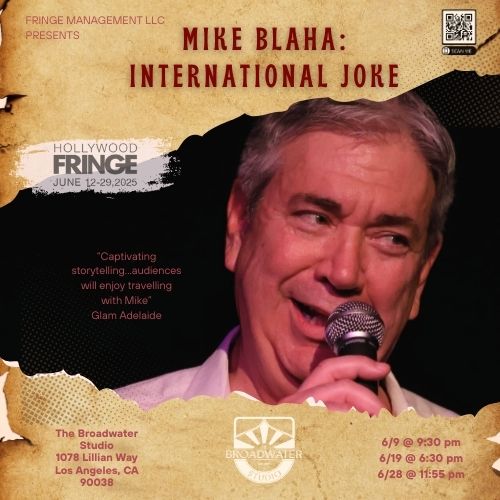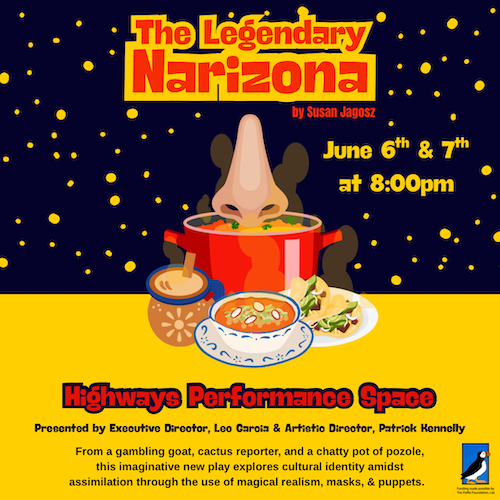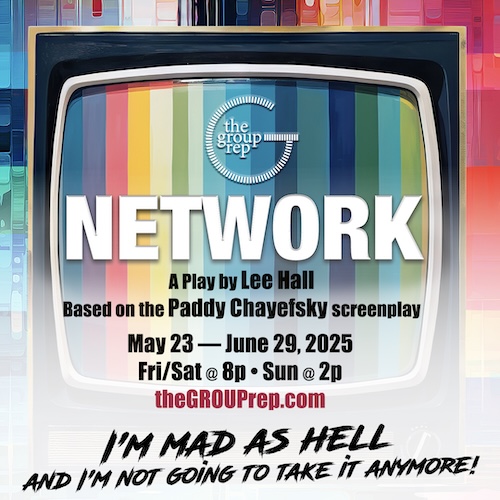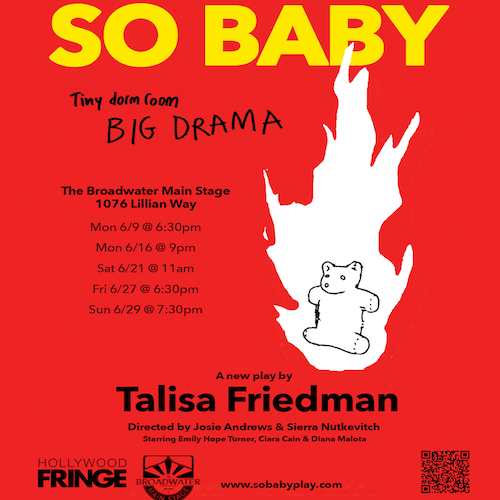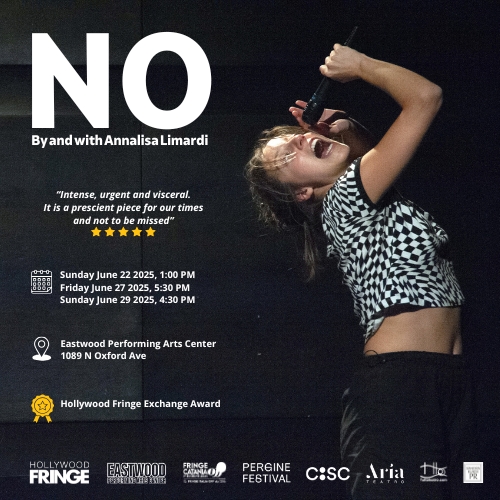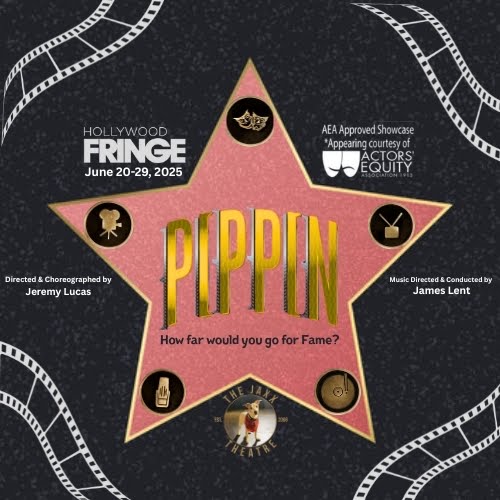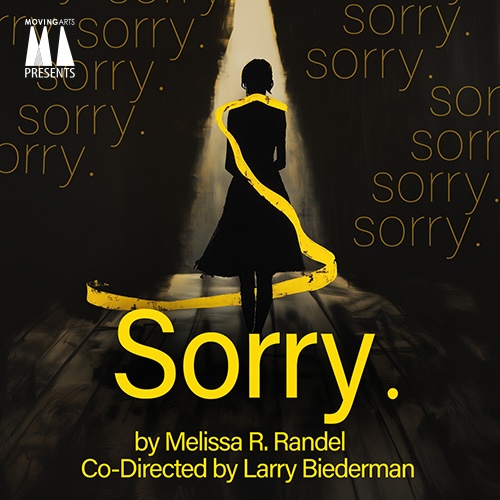Glenn Stanton, LJ Benet, Kasper, Sammy Linkowski and Valerie Larsen (Photo by Zach Mendcez)
Reviewed by Philip Brandes
New Vic Theatre
Through December 17
Given his rags-to-riches career, outsized outlaw persona, and conflicted Christian faith, the late country megastar Johnny Cash is a proven candidate for dramatic treatment, as shown in the 2005 hit biopic, Walk the Line.
Cash’s prodigious talents as a singer/songwriter suggest equal suitability for a stage musical adaptation. There’s certainly no shortage of material to draw from in Cash’s recorded catalog of more than 1,500 songs — 29 of which are featured in Ring of Fire: The Music of Johnny Cash, the jukebox musical created by Richard Maltby, Jr. and conceived by William Meade. The show also debuted in 2005 (albeit to far less success than its contemporaneous cinematic Cash cow).
A revised 2013 version of Ring of Fire, streamlined by Maltby from a cast of six to five, provides the basis for Ensemble Theatre Company’s stylish and musically engaging (though at times conceptually muddled) revival at the New Vic theatre in Santa Barbara.
Director Randy Redd (a veteran of the original Broadway production) deploys a next-generation ensemble comprising Glenn Stanton, Valerie Larsen, Sammy Linkowski, LJ Benet, and Kasper, in musical styles ranging from acoustic country and folk to hard-driving blues, gospel and rockabilly.
The singers surmount further staging challenges by capably performing their own accompaniment on piano, fiddle, acoustic and electric guitar, upright and electric bass, mandolin, harp and various percussive instruments as needed.
Maltby, who created and directed the groundbreaking Fats Waller jukebox musical, Ain’t Misbehavin’, knows his way around the format. Grouping songs popularized by Cash (though not all were written by him), the show roughly tracks major stages of Cash’s life, starting with a dirt-poor “Country Boy” who got C’s and D’s in school but “Straight A’s in Love.”
Following in due course are some of Cash’s most profound soul-searching hits — his affinity for outcasts in “Folsom Prison Blues,” his grappling with amphetamine addiction in “Sunday Mornin’ Coming Down”— which are performed alongside obscure curiosities such as the bad breakup elegy, “Flushed from the Bathroom of Your Heart.”
Trading off lead vocals for each song showcases the singers’ distinctively different ranges, which add lively diversity to the show. None, however, descend to the full depths of Cash’s signature bass-baritone register. Glenn Stanton comes closest with his rich, sonorous delivery of “Flesh and Blood” and the bluesy “Big River,” and best embodies the stamp of hard-lived experience in which Cash’s music was born.
Given the variation in singing styles, the show is in no way a band-style attempt to recreate a Cash performance. The differences lead to key changes that are particularly distracting when the singers alternate verses in “I Walk the Line.”
Those expecting a meaningful biographical portrait should also take note of the subordinate portion of the show’s title: by design, the focus is Cash’s music. A few narrated quotes set the context for some of the medleys, but while the song ”Man in Black” is performed, the character himself never appears.
The intentionally generic blank slate at the show’s narrative core is often at odds with the incorporation of external details specific to Cash’s life — persistent auditioning for Sun Records’ Sam Phillips, or fatefully meeting future wife June Carter at the Grand Ole Opry.
In the absence of a central character, Redd’s staging incorporates strikingly simple design elements to emphasize unifying thematic arcs. An atmospheric sound design by Danny Fiandaca uses the recurring whistle of a chugging locomotive to reinforce the drive and momentum that propelled Cash through poverty, addiction and his worst rebellious impulses. In Amanda Rehbein’s elegantly minimalist scenic backdrop, four wooden panels are positioned with space between them in the shape of cross — an ever-present symbol of the spiritual conviction that got Cash through his darkest times.
That darkness remains far too subtextual, however, to convincingly plumb the depths of Cash’s artistic soul, let alone his biographical one. This is glaringly apparent in the title track’s insertion of a medley centered on June Carter. Being sandwiched between the wistful longing of “If I were a Carpenter” and the romantic duet, “Jackson” makes “Ring of Fire” part of a celebration of love but dampens the dangerous aspect of those flames that burn so hot. Flirtation with damnation has never sounded perkier.
Ensemble Theatre Company, New Vic Theatre, 33 W. Victoria St., Santa Barbara. Wed.-Thurs., 7:30 pm, Fri.-Sat., 8 pm, Sun., 2 pm., Sat., Dec. 9, 3 pm, Sun., Dec. 10, 7 pm; thru Dec. 17. etcsb.org. Running time: two hours and five minutes with an intermission.



